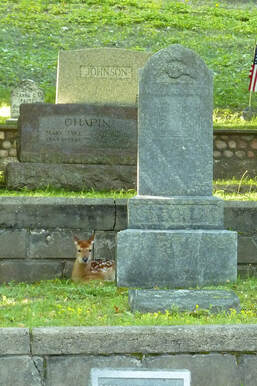Last Stop: Paradise
By Fran Somers
Just like the less-welcome mergansers, every summer hundreds of us are drawn back to the cool, clear waters of Crystal Lake. And every year, some of us start thinking about making this bit of paradise a forever home. A little 8’ x 4’ place maybe, with quiet neighbors and the occasional visitor who brings fresh flowers.
“My parents are in the North (cemetery) and I will be. And all of my friends will be around me,” said CSA archivist Jane Cooper, who often takes peaceful walks through her future home.
 A deer visits the North Cemetery in Frankfort. Photo courtesy of Crystal Lake Township.There are two cemeteries in Crystal Lake Township: North is a 2-minute drive from the CSA office at 1511 Pilgrim Highway. East, also known as the Lutheran or Norwegian Cemetery, is at 1658 Frankfort Highway, near the Frankfort gateway.
A deer visits the North Cemetery in Frankfort. Photo courtesy of Crystal Lake Township.There are two cemeteries in Crystal Lake Township: North is a 2-minute drive from the CSA office at 1511 Pilgrim Highway. East, also known as the Lutheran or Norwegian Cemetery, is at 1658 Frankfort Highway, near the Frankfort gateway.
To be clear, you won’t own the plot of land, according to Amy Ferris, Crystal Lake Township supervisor, who oversees the cemeteries. “If it was your land, you’d be paying taxes on it. You’re buying a burial right.”
Ferris said some families pour ashes straight into the burial plot without a container, and some get more creative. A golfer was buried in his golf bag. A CSA ceramicist made a beautiful urn for a family member’s ashes.
Alan Marble’s father, a lieutenant on a Navy destroyer in WWII, was buried in his tackle box. “Dad and I spent hundreds of hours in the ‘50s and ‘60s trying to catch every rock bass that inhabited the lower Platte River system,” said Alan, a member of the CSA Tennis and Communications Committees. “It was only fitting that his ancient metal cantilever tackle box held his ashes when he was interred.”
Alan’s stepmother went a more fashionable route. Lois “Tussey” Marble “was always dressed to the nines,” Alan said. “She spent a long and rewarding career in Connecticut real estate, and loved her shoes.” Her ashes were put in a Ferragamo box.
“We have lots of requests for green burials,” Amy said, which can involve a biodegradable casket or just a shroud. To date, there have not been any green burials at either cemetery.
“A lot of people get cremated these days,” Amy said. “It’s so much more expensive to go the other way.” Also, the state has no authority over ashes, other than a prohibition against polluting a body of water, she added. The practice was especially frowned on after a CSA swimmer found what appeared to be bone chips from cremains in Crystal Lake years ago.
Burial in either cemetery is cheaper if you’re a property owner in the township. And being a property owner could become a requirement if a few members of the township board have their way. The concern is the likely need to dip into the general fund to cover the rising cost of mowing and sexton fees. The issue has been raised periodically, most recently at a June township meeting, but no motion has been put forward.
If you decide to look for a spot in one of the township cemeteries, you’ll be in good company. Among those in the North Cemetery are:
- Dr. Alonzo Slyfield (1825-1896), the lighthouse keeper for 21 years at Point Betsie. He was also the local doctor and coroner.
- Charles B. Slyfield (1854-1924), one of Dr. Slyfield’s sons, who in 1912 wrote a fascinating account of the family’s hardscrabble life, which is at the Benzie Area Historical Society.
- Ellen Neptuna Fletcher who died of consumption in 1870 at the age of 24. Her father, the Rev. A. H. Fletcher, was the first pastor of the First Congregational church of Frankfort.
- Gordon T. Johnson (1821-1892), a flat-earther who traveled the world to see if this round-earth business had any truth to it. He helped build the Panama Canal, and settled in Joyfield Township before answering President Lincoln’s call for fresh recruits. He served with the Army of the Potomac, surviving some of the deadliest battles of the Civil War.
- John Beverly Collins (1834-1901), a druggist on Frankfort’s Main St. and local postmaster.
- Charles A. Voorheis (1846-1920) who was wounded at Gettysburg and became superintendent of the mill in Frankfort.
- Horace Clifford Frost (1855-1867), who drowned and is reportedly the first person buried at the North Cemetery.
It was the young Frost’s death that prompted his father, Frankfort deacon E. B. Frost, and nine other men to buy 44 acres for the cemetery in 1871, according to “The Story of Frankfort,” by John H. Howard.
The East Cemetery was purchased around 1890. Lots were first sold only to Lutherans for $8 — the families of the Norwegian immigrants who came to Frankfort and Elberta for jobs on the car ferries, the iron works, and as fishermen, according to Andrew Bolander, lead researcher for the Benzie Area Historical Society. “Before that, people were buried on their land.” The cemetery was taken over by the township in 1942 and today visitors can find many of the original family names, including Mathison, Didrikson, Oleson, Carlson, Larson, Holden, Peterson, Johnson, Thompson, Gunderson, Leland, and Sampson.
Nobody relishes planning their final exit, but there is one comfort: You’ll never have to worry about swimmer’s itch again!
_________________________________
More information
- Crystal Lake Township cemeteries: burial fees, cemetery ordinance, maps, and more: https://www.crystallaketwp.org/cemeteries.html
- Benzie Area Historical Society: https://benziemuseum.org
- Locate a burial plot: findagrave.com
